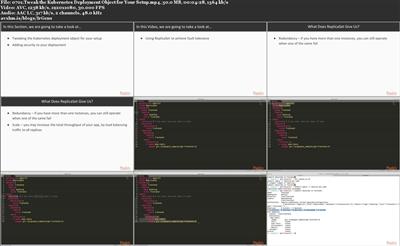Containers for Microservices: Kubernetes and Docker Recipes
.MP4, AVC, 1920x1080, 30 fps | English, AAC, 2 Ch | 2h | 470 MB
Instructor: Tomasz Lelek
Learn
Create secure Docker images to ship your apps
Avoid operational anti-patterns with Kubernetes and Docker tweaks
Leverage a Docker Enterprise Edition Hub to share your images
Use advanced Docker commands for management and networking
Use advanced Kubernetes commands for better security and performance
Use and troubleshoot the Kubernetes proxy, DNS, and its networking stack
Create secure connections between services with no data loss
Debug and troubleshoot Kubernetes storage with advanced debugging commands
Implement service discovery with Kubernetes' advanced networking techniques
Perform zero-downtime deployments of your production apps
About
Docker is popularly used to build, ship, and run containers, and Kubernetes is used to orchestrate Docker containers. Instead of being rival technologies, Docker and Kubernetes complement each other through every stage of deployment. The best way of running a microservice app architecture is via containers as they are lightweight runtime environments and can be run on physical or virtual machines.
If you already have some experience working with Kubernetes and Docker, this course is a perfect guide with recipes that are proven to work with microservice containers using Kubernetes and Docker. Each video supplies a recipe containing a tip, trick, and technique to help you work more effectively and synergistically with Kubernetes and Docker to build, ship, run, and manage containers for your applications.
You will implement tips to help you select a microservice architecture that is appropriate for your application and business, and explore best practices to follow when building and deploying microservices for your apps throughout the workflow. You will use Docker to package and ship your apps and Kubernetes to deploy, manage, and scale them. Optionally, you can also implement best practices when deploying apps to the cloud (AWS) and multi-container microservices. You will improve performance and security in containers and microservices (and facilitate smooth communication within them), ensuring there is no data loss. You will master troubleshooting techniques to help diagnose and debug issues relating to operations, networking, and storage; you will also learn to avoid these to ensure your workflow is efficient.
By the end of the course, you will be confident to efficiently build and deploy containers for microservices using Docker and Kubernetes.
All the code and supporting files for this course are available on GitHub at
github.com/PacktPublishing/Containers-for-Microservices-Kubernetes-and-Docker-Recipes
Features
Create containerized microservices and deploy them synergistically on the cloud with Kubernetes and Docker
Debug and troubleshoot most advanced Kubernetes problems related to networking, storage, and operations with advanced tricks and techniques
Use Kubernetes to implement robust production deployments with zero downtime
Download link:Kod:rapidgator_net: https://rapidgator.net/file/167e1a9cff354ac44672ecbf016f43c0/qivoi.Containers.for.Microservices.Kubernetes.and.Docker.Recipes.rar.html nitroflare_com: https://nitroflare.com/view/28355CD755F0C55/qivoi.Containers.for.Microservices.Kubernetes.and.Docker.Recipes.rarLinks are Interchangeable - No Password - Single Extraction
1 sonuçtan 1 ile 1 arası
-
18.10.2019 #1Üye



- Üyelik tarihi
- 20.08.2016
- Mesajlar
- 144.947
- Konular
- 0
- Bölümü
- Bilgisayar
- Cinsiyet
- Kadın
- Tecrübe Puanı
- 153
Containers for Microservices Kubernetes and Docker Recipes
Konu Bilgileri
Users Browsing this Thread
Şu an 1 kullanıcı var. (0 üye ve 1 konuk)



 LinkBack URL
LinkBack URL About LinkBacks
About LinkBacks






 Alıntı
Alıntı
Konuyu Favori Sayfanıza Ekleyin